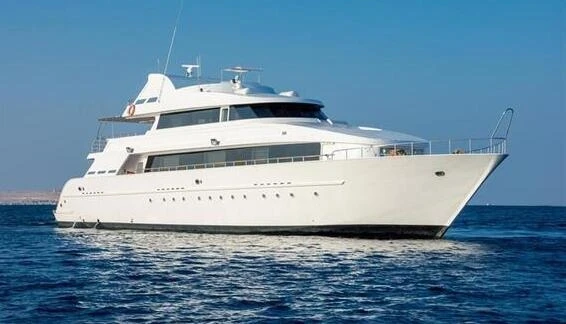Gulf of Tadjoura (8 Days / 7 Nights - 16 Dives)
Trip highlights: whale sharks, shark action, dolphins, manta rays, schooling fish & big pelagics, non diving activities
Diving environment: advanced divers, beginner divers, drift diving, healthy reefs, off the beaten track, wall diving, wreck diving
Dive sites and activities: Gulf of Tadjoura: Ras Eiro, Ras Foul, Turtle Bay, The Dome, Ras Korali, Red Virgin; Ghoubet Bay: Star Bay, The Crack, The Wall. Optional excursion to Lake Assal and city tour.
Day 1
A staff member will meet at Djibouti International Airport and transfer you to the harbour for boarding the Lucy liveaboard. The crew will greet you, show you to your cabin, and provide a detailed boat briefing that will help familiarize you with your new home for next week. Dinner will be served in the saloon and this will be a great opportunity to get to know the other guests on this cruise. The boat will leave port in the early in the morning, headed towards Moucha Island, to begin diving early the next day.
Core Days
This dive safari takes you to the Bay of Ghoubet and the Gulf of Tadjoura, in search of whale sharks. The whale shark season runs from November until the end of January/February, when these gentle giants arrive in large numbers to feed in the plankton-rich waters. The safari includes both scuba diving and snorkeling opportunities to interact with the awesome sharks. It is a truly off-the-beaten-track destination that few people have visited, with over 300 km of coastline and many spots with an abundance of marine life to dive and explore. There are ship wrecks and pristine hard coral reefs, and dolphins, manta rays and even whales, are also sometimes seen in this stretch of sea. The tempting warm waters and lack of currents make for easy diving conditions that are suitable for both beginners and experienced divers.
All meals are served buffet style in the dedicated dining section of the air-conditioned lounge on the main deck. They consist of breakfast, lunch and dinner, plus there are some snacks and fruit. Drinking water, tea and coffee, soft drinks, and beers are available onboard. The food is typically international and Italian cuisine, plus several incredible Arabic delicacies.
The morning of the final full day will be spent diving until around 2 pm, then the yacht will make its way back to port by early evening. A city tour is available for guests that want to join.
Day 8
Disembarkation is after breakfast. The crew will then transfer you back to the airport.
For guests that have late afternoon or evening flights, a half-day tour of Lake Assal can be arranged.
[Information is best estimate in ideal circumstances and subject to changes beyond our control. The itinerary is a guide only and may be adapted to best suit the weather, tides, currents, availability and other prevailing events. Price is for the cruise, not for an exact number of dives].




